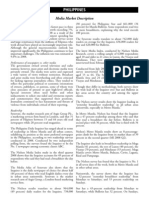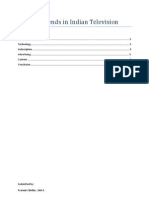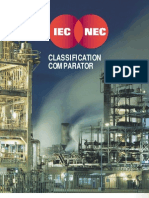0 ratings0% found this document useful (0 votes)
39 viewsRural Development Responses To COVID19
Rural Development Responses To COVID19
Uploaded by
Nathaniel Vincent A. LubricaThe powerpoint highlights the rural development response to COVID19 in the Philippines focusing on the Balik Probinsiya Program. I enhanced my analysis with scientific literatures as well as the OECD report.
Copyright:
© All Rights Reserved
Available Formats
Download as PDF, TXT or read online from Scribd
Rural Development Responses To COVID19
Rural Development Responses To COVID19
Uploaded by
Nathaniel Vincent A. Lubrica0 ratings0% found this document useful (0 votes)
39 views21 pagesThe powerpoint highlights the rural development response to COVID19 in the Philippines focusing on the Balik Probinsiya Program. I enhanced my analysis with scientific literatures as well as the OECD report.
Original Title
Rural Development Responses to COVID19
Copyright
© © All Rights Reserved
Available Formats
PDF, TXT or read online from Scribd
Share this document
Did you find this document useful?
Is this content inappropriate?
The powerpoint highlights the rural development response to COVID19 in the Philippines focusing on the Balik Probinsiya Program. I enhanced my analysis with scientific literatures as well as the OECD report.
Copyright:
© All Rights Reserved
Available Formats
Download as PDF, TXT or read online from Scribd
Download as pdf or txt
0 ratings0% found this document useful (0 votes)
39 views21 pagesRural Development Responses To COVID19
Rural Development Responses To COVID19
Uploaded by
Nathaniel Vincent A. LubricaThe powerpoint highlights the rural development response to COVID19 in the Philippines focusing on the Balik Probinsiya Program. I enhanced my analysis with scientific literatures as well as the OECD report.
Copyright:
© All Rights Reserved
Available Formats
Download as PDF, TXT or read online from Scribd
Download as pdf or txt
You are on page 1of 21
RURAL DEVELOPMENT RESPONSES TO
COVID19:
BALIK PROBINSIYA, BAGONG PAG-ASA
(BP2) PROGRAM
In Partial Fullfillment to the Requirements of RD 308
November 21, 2020
Nathaniel Vincent A. Lubrica
Objectives of the Presentation
a. State the rationale of establishing EO 114;
b. Discuss the features of the BP2 Program;
c. State the advantages of the BP2 Program;
d. State the disadvantages of the BP2 Program;
e. Discuss the possible impact of the BP2 Program to rural
development; and
f. Evaluate the BP2 Program vis a vis rural development models and
approaches.
Report Outline
I. Rationale
II. Program Description
III. Advantages
IV. Disadvantages
V. Conclusion
VI. Recommendation
VII. References
Rationale
• High COVID-19 infection rate in urban areas
• Perrineal population problems in megacities and HUCs
• Constituional provisions for rural development: poverty reduction,
social justice and equity, and ecological balance
• PDRDP (2017-2022)
• Ambisyon Natin 2040
• RA 11469
• Rural areas both help and is affected by the pandemic
Opportunities for rural development (OECD, 2020)
Program Description
• Decongestion of NCR
• Informal settlers as special targets
• Immediate Response strategies
• The Balik Probinsiya, Bagong Pagasa Council
• Key Areas: Empowerment of Local Industries, Food Security and Agricultural
Productivity, Social Welfare, Health, and Employment, and Development of
Infrastructure
• Towards a Law
• Inter-agency Coordination
• Setting Up Model “Balik” Villages
• BP2 Website: balikprobinsiya.ph
BP2 Council Members
Advantages
• Warm Reception among
Beneficiaries: Decongesting NCR
• Warm Reception Among LGUs
• Program Statistics
• Proof of Beneficiaries
• Regional Disparity on Wages can
be Addressed
• Local Benefits can be Realized
• Consultations for Feedback
Disadvantages
• Resources needed at a fast pace
• More supporting policies
needed
• Impacts need to be proven
• Healthcare and Economic
Problems in rural areas
• Exacerbation of Healthcare and
Economic Problems in Rural
Areas
• Long Term Preparations is
Needed
Impact to Rural Development
• The BP2 program has four key results areas to ensure inclusive and
balanced urban and rural development, and the creation of resilient
and sustainable communities:
(1) the empowerment of local industries;
(2) food security and agricultural productivity;
(3) housing, social welfare, health, employment and human resource
development; and
(4) infrastructure development.
Conclusion
• Opportunities such as the BP2 came to fore during the pandemic.
Similar approaches in the past mostly failed because of the lack of the
appreciation on rural development as well as the recognition on the
disadvantages of centralized urban growth.
• The constitution as well as Philippine development strategies and
policies recognize the importance of rural development which paved
way to the justification of BP2 program through EO 114.
Conclusion
• The start of the implementation of the project shows a positive
response from multiple council members, local government units as
well as the target beneficiaries. The online registration as well as the
strategic communication plan proved to be effective reaching out to
the target beneficiaries.
• It was observed that resettlement areas as well as partnership with
rural industries are preliminarily established. With the latest
registrants reaching 100,319, statistics can provide trends on the
demographics and target destination.
• It was found that the program can provide solution to other problems
such as regional wage disparities and insurgencies. Furthermore, the
program include consultations as a feedback mechanism.
Conclusion
• Despite of the advantages of a program, there will always be disadvantages.
The rapid action needed for the program implementation posed a big
challenge in government systems as well as the readiness of the host local
government units.
• BP2 requires other supporting policies linked to recovery and tax incentives
since the program emanated from the emergency powers of the President in
the re-allocation of funds to the program.
• A big disadvantage like any other program is its impact which halted
nationwide institutionalization. Other issues identified were the program’s
healthcare and economic effect.
• However, Agnoetti et al. (2020) confirms the positive effect of rural
development by decreasing exposure to COVID-19 along with low energy
inputs to the environment.
Conclusion
• All in all, the program shows good reception from both actors and
stakeholders. Though there were several disadvantages, I feel that
the program can address the issues during the process with sound
coordination and in-built feedback mechanisms. Nevertheless, the
program is continuously implemented.
Recommendations
• Though consultations were conducted, accessible sources does not
clearly illustrate the involvement and inputs of stakeholders. Aside
from stakeholder inputs, the host communities should be involved in
the program. The readiness of the host municpality/community must
also be taken into consideration.
• Only few members of the council were actively engaging and
formulating short term, medium term, and long term programs
aligned to BP2. Anent to these, another major consideration would
be blending or complementing the BP2 to existing line agency, local
government unit, and community plans, programs, and activities.
Recommendations
• In the US through USDA and Europe through the European
Commission, COVID19 responses focus on loans and programs for
agriculture, and rural businesses. Thus, an office that focuses on rural
development must be established to ensure the sustainability of BP2.
• The Kerlala model can be considered in preparing the host
communities as well as the integration of the new resettlement areas.
• Program impact research framework needs to be formulated and
conducted
Benchmark on
OECD Country
Best Practices
References
• Agnoletti, M., Manganelli, S., Piras, F., 2020. Covid-19 and rural landscape. Landscape
and Urban Planning 204 (2020) 103995
• Chatukulam, J., Tharamangalam, J., 2021. The Kerala model in the time of COVID19:
Rethinking state, society, and democracy. World Development 137 (202.1) 105207.
• Forbes, March 17, 2020. How the Covid-19 Coronavirus Pandemic is Impacting Rural
America. Retrieved from
https://www.forbes.com/sites/claryestes/2020/03/17/coronavirus-and-rural-
america/?sh=770c45cae108
• GMA News Online, November 17, 2020. NEDA suggests to defer institutionalization of
Balik Probinsya program. Retrieved from
https://www.gmanetwork.com/news/news/nation/764453/neda-suggests-to-defer-
institutionalization-of-balik-probinsya-program/story/
References
• GMA News Online, May 13, 2020. Balik Probinsya program got nearly 10k applicants in 5 days –NHA exec.
Retrieved from https://www.gmanetwork.com/news/news/nation/738034/balik-probinsya-program-got-nearly-
10k-applicants-in-5-days-nha-exec/story/
• Inquirer, May 26, 2020. Wage is key issue in ‘Balik Probinsya’. Retrieved from
https://newsinfo.inquirer.net/1280722/wage-is-key-issue-in-balik-probinsya
• Inquirer, May 28, 2020. ‘Balik Probinsya’ program to generate more problems in rural areas — Gabriela. Retrieved
from https://newsinfo.inquirer.net/1282627/balik-probinsya-program-to-generate-more-problems-in-rural-areas-
gabriela
• McKenzie, G. and Adams, B., 2020. A country comparison of place-based activity response to COVID-19 policies.
Applied Geography 125 (2020) 102363.
• Mindanao Daily, October 12, 2020. Balik Probinsya Program preparations continue as Bong Go pushes for holistic
approach in boosting economic opportunities in the provinces. Retrieved from
https://www.mindanaodailynews.com/news/nation/trending-news/balik-probinsya-program-preparations-
continue-as-bong-go-pushes-for-holistic-approach-in-boosting-economic-opportunities-in-the-provinces
• OECD, June 16, 2020. Policy Implications of Coronavirus Crisis for Rural Development. Retrieved from
http://www.oecd.org/coronavirus/policy-responses/policy-implications-of-coronavirus-crisis-for-rural-
development-6b9d189a/
References
• Philippine News Agency, May 31, 2020. MinDA completes ‘Balik Probinsya’ consultations. Retrieved from
https://www.pna.gov.ph/articles/1104466
• Philippine News Agency, May 29, 2020. 'Balik Probinsya' to help address insurgency: Or. Mindoro mayor.
Retrieved from https://www.pna.gov.ph/articles/1104193
• Philippine News Agency, June 1, 2020. Lanao Norte guv mulls BPO village as ‘Balik’ model. Retrieved from
https://www.pna.gov.ph/articles/1104577
• Philippine News Agency, June 10, 2020. 85K enroll for Balik Probinsya; gov't cites LGUs' preparedness. Retrieved
from https://www.pna.gov.ph/articles/1105434
• Philippine News Agency, June 18, 2020. Go cites BP2 'template communities' in Mindanao. Retrieved from
https://www.pna.gov.ph/articles/1106369
• Philippine News Agency, June 24, 2020. Model 'Balik' hub ground breaks in Lanao Norte town. Retrieved from
https://www.pna.gov.ph/articles/1106897
• Philppine News Agency, October 1, 2020. Go lauds holistic approach of BP2 program. Retrieved from
https://www.pna.gov.ph/articles/1117190
• Philippine News Agency, August 20, 2020. Zambo Norte town readies 'Balik Probinsya' plantation area. Retrieved
from https://www.pna.gov.ph/articles/1112848
• Tribune, November 11, 2020. DENR Bataan allots land for ‘Balik Probinsiya’ program. Retrieved from
https://tribune.net.ph/index.php/2020/11/11/denr-bataan-allots-land-for-balik-probinsiya-program/
You might also like
- Case Study Bank of America (A)Document7 pagesCase Study Bank of America (A)Setiawan AchmadNo ratings yet
- JVO Winners and FellowsDocument34 pagesJVO Winners and FellowsCenter for Media Freedom & Responsibility100% (2)
- Final Peace Project Report FormatDocument12 pagesFinal Peace Project Report FormatLen almira LaganggaNo ratings yet
- Balik Probinsya HandbookDocument64 pagesBalik Probinsya HandbookMunicipalLegal Kalibo100% (1)
- Business EthicsDocument3 pagesBusiness Ethicstushar_jalNo ratings yet
- Case StudyDocument3 pagesCase StudymaheshpatelNo ratings yet
- IRR of R.A 9208Document105 pagesIRR of R.A 9208maloudelaNo ratings yet
- DM Phrod 2021 0590 Balik Probinsya Bagong Pag Asa BP2 BeneficiariesDocument1 pageDM Phrod 2021 0590 Balik Probinsya Bagong Pag Asa BP2 BeneficiariesannabelleNo ratings yet
- Ra 9208Document9 pagesRa 9208Rey PerezNo ratings yet
- Edited - Draft OBE PSG For B. Filipino Language Ed As of Aug 1 2016Document27 pagesEdited - Draft OBE PSG For B. Filipino Language Ed As of Aug 1 2016Mary Rose Pablo ♥100% (3)
- Media As An Organisation LM124Document19 pagesMedia As An Organisation LM124Tommy KC100% (4)
- Cyber JournalismDocument14 pagesCyber Journalismtusharpsyna100% (1)
- Is It New? 2. Is It Unusual? 3. Is It Interesting or Significant? 4. Is It About People?Document5 pagesIs It New? 2. Is It Unusual? 3. Is It Interesting or Significant? 4. Is It About People?Stephanie EpiscopeNo ratings yet
- Week 6: Journalistic Writing. IntroductionDocument98 pagesWeek 6: Journalistic Writing. IntroductionDamian Lambidonitis100% (1)
- Good JournalismDocument3 pagesGood Journalismalok.ittefaqNo ratings yet
- What Is Network Journalism'?Document8 pagesWhat Is Network Journalism'?Adriana BarsottiNo ratings yet
- 2.1 - Health Journalism - Concept, Need and ImportanceDocument3 pages2.1 - Health Journalism - Concept, Need and ImportancePela KqbcgrlaNo ratings yet
- News AgencyDocument18 pagesNews AgencyDEEPAK GROVER100% (1)
- Introduction of News PaperDocument3 pagesIntroduction of News PaperPuneeth P GowdaNo ratings yet
- Philippines: Media Market DescriptionDocument4 pagesPhilippines: Media Market DescriptionZeno MartinezNo ratings yet
- Syllabus of Introduction To JournalismDocument14 pagesSyllabus of Introduction To JournalismNalin Singh100% (2)
- Philippine Journalism Review (December 2002)Document6 pagesPhilippine Journalism Review (December 2002)Center for Media Freedom & ResponsibilityNo ratings yet
- Module OneDocument13 pagesModule OnetemesgenNo ratings yet
- Chap 4Document21 pagesChap 4Mulieyati Al 'NizamNo ratings yet
- Challenges of The Mass Media in Contributing To National DevelopmentDocument14 pagesChallenges of The Mass Media in Contributing To National DevelopmentNnamdiNo ratings yet
- Digital Journalism: A Rigorous, Enriching ProgramDocument2 pagesDigital Journalism: A Rigorous, Enriching Programjohn_lonerNo ratings yet
- What Is Child Protection?: Training ManualDocument80 pagesWhat Is Child Protection?: Training ManualJefferson CanalejaNo ratings yet
- The Challenges and Prospects of The Nigerian Broadcast Media Switch Over From Analogue To Digital BroadcastingDocument26 pagesThe Challenges and Prospects of The Nigerian Broadcast Media Switch Over From Analogue To Digital BroadcastingPst W C Peters100% (1)
- Ambisyon Natin 2040: Pbgen Randolf R Delfin (Ret.)Document37 pagesAmbisyon Natin 2040: Pbgen Randolf R Delfin (Ret.)suigeneris2014No ratings yet
- Timeliness - The Images Have Meaning In: PhotojournalismDocument9 pagesTimeliness - The Images Have Meaning In: PhotojournalismOmar FermosoNo ratings yet
- Module 1 - Media and The Social World PDFDocument4 pagesModule 1 - Media and The Social World PDFmaosalvadorNo ratings yet
- J301F Fundamental Issues in Journalism Spring 2017: Shuninglu@utexas - Edu Martin - Riedl@utexas - EduDocument4 pagesJ301F Fundamental Issues in Journalism Spring 2017: Shuninglu@utexas - Edu Martin - Riedl@utexas - EduCriton PlatoNo ratings yet
- History of Public Relations - Dominant Practices and TraditionsDocument4 pagesHistory of Public Relations - Dominant Practices and TraditionsCassandra YbarraNo ratings yet
- Paglaganap NG Kulturang PopularDocument9 pagesPaglaganap NG Kulturang PopularIra Mhae Villasoto100% (1)
- Health JournalismDocument18 pagesHealth JournalismSahil TiwariNo ratings yet
- Science Journalism HandbookDocument38 pagesScience Journalism HandbookSartika DewiNo ratings yet
- Mil Position PaperDocument3 pagesMil Position PaperBenedict riveraNo ratings yet
- Revolution Vs ReformationDocument7 pagesRevolution Vs Reformationiiumdaily0% (1)
- J Law PDFDocument70 pagesJ Law PDFNelson MgeniNo ratings yet
- The Trust Factor: An EJN Review of Journalism and Self-RegulationDocument80 pagesThe Trust Factor: An EJN Review of Journalism and Self-RegulationEthical Journalism NetworkNo ratings yet
- Philippine Journalists' Safety GuideDocument74 pagesPhilippine Journalists' Safety GuideVERA FilesNo ratings yet
- Journalism: Findings Hard and Soft News: A Review of Concepts, Operationalizations and KeyDocument20 pagesJournalism: Findings Hard and Soft News: A Review of Concepts, Operationalizations and Keyfranklin_ramirez_80% (1)
- From Hard To Soft News StandardsDocument22 pagesFrom Hard To Soft News StandardsÉbida SantosNo ratings yet
- Essay On Education: Education Is An Essential Tool That Imparts Knowledge To ImproveDocument1 pageEssay On Education: Education Is An Essential Tool That Imparts Knowledge To ImproveElmi TvNo ratings yet
- Ambisyon 2040Document16 pagesAmbisyon 2040Masirag MannyNo ratings yet
- Media Writing ChapterDocument22 pagesMedia Writing ChapterBakhtawer ZainNo ratings yet
- Radio and TV ProductionDocument26 pagesRadio and TV Productionmykjmjen.MVgmail.comNo ratings yet
- Characteristics of Philippine Political CultureDocument10 pagesCharacteristics of Philippine Political Cultureannie santosNo ratings yet
- Radio Jockey and Essential Qualities To Become An Radio JockeyDocument2 pagesRadio Jockey and Essential Qualities To Become An Radio JockeyVarshNo ratings yet
- Environmental CommunicationDocument33 pagesEnvironmental CommunicationVivek RajvardhanNo ratings yet
- Future of ICT 2020: Hidden Assumptions and Future ChallengesDocument70 pagesFuture of ICT 2020: Hidden Assumptions and Future ChallengesGabrielle NgNo ratings yet
- Current Trends in Indian TelevisionDocument8 pagesCurrent Trends in Indian Televisionthe_f0rsak3nNo ratings yet
- Editorial WritingDocument41 pagesEditorial WritingKaren ManggaoNo ratings yet
- Active Media Radio: by Jawad GilaniDocument53 pagesActive Media Radio: by Jawad GilanisoldasterzNo ratings yet
- Chapter 1 Asar Na Q Sau 2Document16 pagesChapter 1 Asar Na Q Sau 2Josel CecilioNo ratings yet
- The Role of Social Media in Crisis Preparedness, Response and RecoveryDocument26 pagesThe Role of Social Media in Crisis Preparedness, Response and RecoveryJohn808No ratings yet
- COM+255 HANDOUTS ReportingDocument21 pagesCOM+255 HANDOUTS Reportingmohammedkatari5No ratings yet
- Initial Poverty and Social AnalysisDocument3 pagesInitial Poverty and Social AnalysisKristine PresbiteroNo ratings yet
- Relations Between PFM and PRGFDocument27 pagesRelations Between PFM and PRGFProfessor Tarun DasNo ratings yet
- Kisoro District Five Year Dev - Plan 2016Document319 pagesKisoro District Five Year Dev - Plan 2016Alex NkurunzizaNo ratings yet
- Area Classification IEC NECDocument18 pagesArea Classification IEC NECin107247100% (2)
- Chapter 3 What Is MatterDocument35 pagesChapter 3 What Is MatterarifzaidialwiNo ratings yet
- 4873-File Utama Naskah-14790-1-10-20210803Document6 pages4873-File Utama Naskah-14790-1-10-20210803Syahrul NisyaNo ratings yet
- The Analysis of Taiwan's Labor Standards ActDocument2 pagesThe Analysis of Taiwan's Labor Standards ActJeslynNo ratings yet
- Solid Wastes Module 4Document2 pagesSolid Wastes Module 4Belle MendozaNo ratings yet
- Conversaciones de Libro InglesDocument99 pagesConversaciones de Libro Ingleseli hcNo ratings yet
- Photosynthesis Review WorksheetDocument7 pagesPhotosynthesis Review Worksheetneeti100% (1)
- Best Pre-Primary School: Jr. KG Course For The - Ii TestDocument9 pagesBest Pre-Primary School: Jr. KG Course For The - Ii Testapi-233604231No ratings yet
- SEARCHITSecurity Assessment ToolDocument80 pagesSEARCHITSecurity Assessment Toolholamundo123100% (1)
- CL - ClutchDocument22 pagesCL - ClutchJorge LainezNo ratings yet
- Medical Repricing RevisionDocument10 pagesMedical Repricing RevisionYaaminni ArumukamNo ratings yet
- Blessy E. Sumbi Bsed-Filipino Reflection 1. Teacher's DiaryDocument6 pagesBlessy E. Sumbi Bsed-Filipino Reflection 1. Teacher's DiaryBLESSY SUMBINo ratings yet
- Manual Dezumidificator TurbionaireDocument108 pagesManual Dezumidificator TurbionairePerfectreviewNo ratings yet
- The Andhra Pradesh State Co-Operative Bank LTD.: (Govt. Partnered Scheduled Bank)Document17 pagesThe Andhra Pradesh State Co-Operative Bank LTD.: (Govt. Partnered Scheduled Bank)gowthami ravinuthalaNo ratings yet
- Essay Outline WritingDocument4 pagesEssay Outline WritingAgum Fajar100% (1)
- Building A Strong Family RelationshipDocument17 pagesBuilding A Strong Family RelationshipKimberly GuinoNo ratings yet
- Botswana Livestock Crop ReportDocument47 pagesBotswana Livestock Crop ReportOpzasets100% (1)
- Chapter 5-1Document9 pagesChapter 5-1Bkibru aetsubNo ratings yet
- Burn's: Daily Record of Dysfunctional ThoughtsDocument1 pageBurn's: Daily Record of Dysfunctional ThoughtsMadison FurtadoNo ratings yet
- The Color Encyclopedia of Ornamental Grasses - SedDocument689 pagesThe Color Encyclopedia of Ornamental Grasses - SedKoriander von Rothenburg100% (2)
- HAVIT Price List - 25.01.2023Document23 pagesHAVIT Price List - 25.01.2023Abu Bakar Siddik RajNo ratings yet
- Complete Comprehension Year 3 Printable TextsDocument26 pagesComplete Comprehension Year 3 Printable TextslamiaanegmNo ratings yet
- Software Access Catalog Sample ListDocument1,004 pagesSoftware Access Catalog Sample ListPaula Jara VargasNo ratings yet
- Servo2006 07Document84 pagesServo2006 07Karina Cristina Parente100% (1)
- Learner'S Licence: Form 3 (See Rule 3 (A) and 13)Document1 pageLearner'S Licence: Form 3 (See Rule 3 (A) and 13)amandeepsingh.crawlappsNo ratings yet
- Ensayo Sobre Comunicación Verbal y No VerbalDocument6 pagesEnsayo Sobre Comunicación Verbal y No Verbalg68w3r14100% (1)
- Fundametals of PolymerDocument51 pagesFundametals of Polymertemesgen abebeNo ratings yet
- Gestalt Therapy Approach To PsychopathologyDocument11 pagesGestalt Therapy Approach To PsychopathologyNina S MoraNo ratings yet
- BDP - Brgy. Roosevelt PDFDocument45 pagesBDP - Brgy. Roosevelt PDFMarnie100% (1)
- Sister Margaret Beatty's CommentsDocument2 pagesSister Margaret Beatty's Commentssavannahnow.comNo ratings yet

























































































